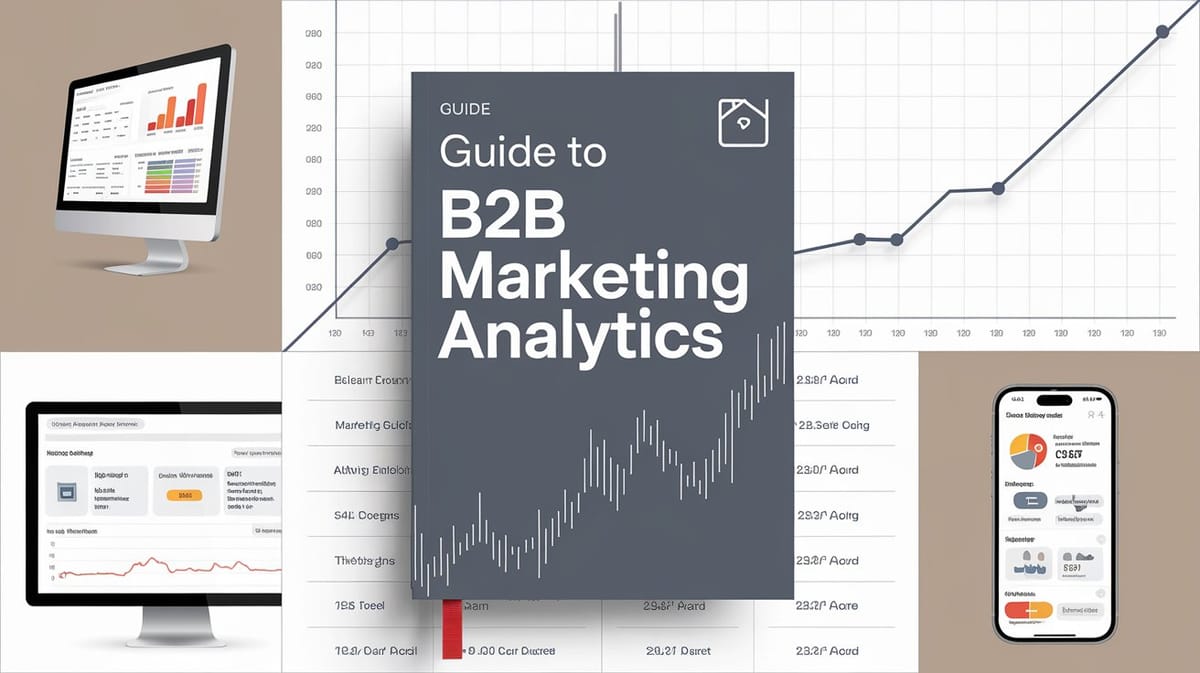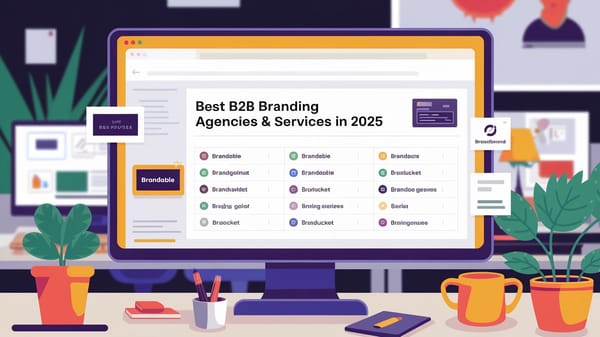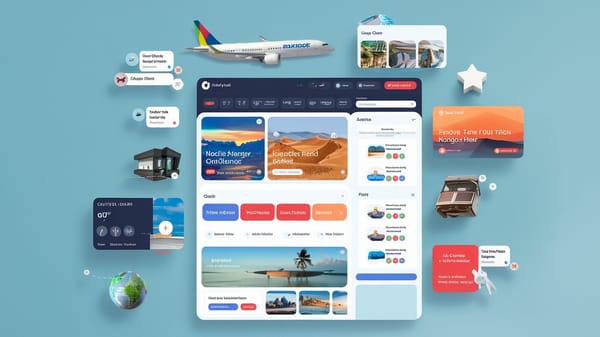The Comprehensive Guide to B2B Marketing Analytics

In the rapidly evolving landscape of B2B marketing, data has emerged as the cornerstone of successful strategies. As businesses strive to understand complex customer interactions and optimize their marketing efforts, B2B marketing analytics has become an indispensable tool. This guide delves into the transformative power of analytics, offering insights into how businesses can leverage data to drive growth and achieve a competitive edge.
B2B marketing analytics involves the systematic measurement and analysis of data generated by marketing activities. It enables businesses to make informed, data-driven decisions, aligning marketing efforts with broader business objectives. Furthermore, companies utilizing analytics are 2.6 times more likely to surpass their revenue goals compared to those that do not.
The significance of B2B marketing analytics is underscored by its ability to transform raw data into actionable insights. By understanding customer behavior and marketing performance, businesses can optimize campaigns, improve lead generation, and ultimately drive revenue growth.
In this guide, we will explore the critical role of B2B marketing analytics, the key metrics every marketer should track, and the tools and techniques that can streamline processes and enhance decision-making. Whether you are a marketing manager, CMO, or data analyst, this guide will equip you with the knowledge to harness the power of analytics effectively, ensuring long-term business success.
You can also visit Oncely.com to find more Top Trending AI Tools. Oncely partners with software developers and companies to present exclusive deals on their products. One unique aspect of Oncely is its “Lifetime Access” feature, where customers can purchase a product once and gain ongoing access to it without any recurring fees. Oncely also provides a 60-day money-back guarantee on most purchases, allowing customers to try out the products and services risk-free.
Oncely are hunting for the most fantastic AI & Software lifetime deals like the ones below or their alternatives:

Table of Contents
- Understanding B2B Marketing Analytics
- Importance of B2B Marketing Analytics
- Key Metrics in B2B Marketing Analytics
- Tools for B2B Marketing Analytics
- Challenges in B2B Marketing Analytics
- Future Trends in B2B Marketing Analytics
- Key Metrics for B2B Marketing Analytics
- Return on Investment (ROI) by Channel
- Customer Acquisition Cost (CAC)
- Customer Lifetime Value (CLV)
- Lead Generation and Conversion Rates
- Engagement Metrics
- Tools for B2B Marketing Analytics
- B2B Marketing Attribution Tools
- Product Analytics Tools
- All-in-One Marketing Platforms
- Productivity and Collaboration Tools
- Customer Relationship Management (CRM) Tools
- Leveraging B2B Marketing Analytics for Business Growth
- Data-Driven Decision Making
- Personalization and Customer Segmentation
- Enhancing Lead Generation and Conversion
- Optimizing Marketing Spend
- Measuring and Improving Customer Experience
Understanding B2B Marketing Analytics
B2B marketing analytics is a critical component of modern business strategies, enabling companies to make data-driven decisions that enhance their marketing efforts. This section delves into the essential aspects of B2B marketing analytics, focusing on its importance, key metrics, tools, challenges, and future trends.
Importance of B2B Marketing Analytics
B2B marketing analytics plays a pivotal role in understanding customer behavior, optimizing marketing strategies, and improving ROI. By analyzing data from various sources, businesses can gain insights into customer preferences, market trends, and the effectiveness of their marketing campaigns. According to a report by Forrester, companies that leverage data-driven marketing are six times more likely to be profitable year-over-year. This underscores the importance of integrating analytics into B2B marketing strategies to drive growth and competitiveness.
Key Metrics in B2B Marketing Analytics
Identifying and tracking the right metrics is crucial for the success of B2B marketing analytics. Some of the most important metrics include:
-
Lead Conversion Rate: This metric measures the percentage of leads that convert into customers. A higher conversion rate indicates effective marketing strategies and sales processes. According to HubSpot, the average lead conversion rate for B2B companies is around 2.23%.
-
Customer Acquisition Cost (CAC): CAC is the total cost of acquiring a new customer, including marketing and sales expenses. Lowering CAC while maintaining or increasing customer quality is a key goal for B2B marketers.
-
Customer Lifetime Value (CLV): CLV estimates the total revenue a business can expect from a single customer account. It helps in understanding the long-term value of customer relationships and informs strategies for customer retention and upselling.
-
Marketing Qualified Leads (MQLs) and Sales Qualified Leads (SQLs): These metrics help in assessing the quality of leads generated by marketing efforts. MQLs are leads deemed more likely to become customers based on engagement, while SQLs are vetted by sales teams as ready for direct sales efforts.
-
Return on Marketing Investment (ROMI): This metric evaluates the effectiveness of marketing campaigns by comparing the revenue generated to the cost of the marketing efforts. A positive ROMI indicates successful marketing strategies.
Tools for B2B Marketing Analytics
Several tools are available to assist businesses in implementing effective B2B marketing analytics. These tools help in collecting, analyzing, and visualizing data to make informed decisions:
-
Google Analytics: Widely used for tracking website traffic and user behavior, Google Analytics provides insights into how visitors interact with a website, which can inform content and marketing strategies.
-
HubSpot: This platform offers a suite of tools for inbound marketing, sales, and customer service, including analytics features that track lead generation, conversion rates, and customer engagement.
-
Salesforce: Known for its CRM capabilities, Salesforce also provides robust analytics tools that help in tracking sales performance, customer interactions, and marketing campaign effectiveness.
-
Tableau: A powerful data visualization tool, Tableau helps businesses create interactive and shareable dashboards that provide insights into complex data sets.
-
Marketo: Specializing in marketing automation, Marketo offers analytics features that track campaign performance, lead nurturing, and customer engagement.
Challenges in B2B Marketing Analytics
Despite its benefits, B2B marketing analytics presents several challenges that businesses must navigate:
-
Data Integration: Integrating data from multiple sources, such as CRM systems, social media, and email marketing platforms, can be complex and time-consuming. Ensuring data consistency and accuracy is crucial for reliable analytics.
-
Data Privacy and Compliance: With increasing regulations like GDPR and CCPA, businesses must ensure that their data collection and analysis practices comply with legal requirements. This includes obtaining consent from users and protecting their data from breaches.
-
Skill Gaps: Many organizations face a shortage of skilled professionals who can effectively analyze and interpret data. Investing in training and hiring skilled analysts is essential for leveraging analytics effectively.
-
Attribution Modeling: Accurately attributing sales and conversions to specific marketing efforts can be challenging, especially in multi-channel marketing environments. Developing robust attribution models is necessary to understand the true impact of marketing activities.
Future Trends in B2B Marketing Analytics
The landscape of B2B marketing analytics is continuously evolving, with several trends shaping its future:
-
Artificial Intelligence and Machine Learning: AI and machine learning are increasingly being used to enhance analytics capabilities, enabling predictive analytics, automated insights, and personalized marketing strategies. According to Gartner, by 2025, AI will be a top investment priority for more than 30% of B2B marketers.
-
Real-Time Analytics: The demand for real-time data analysis is growing, allowing businesses to make immediate adjustments to their marketing strategies based on current data. This trend is driven by the need for agility in rapidly changing markets.
-
Increased Focus on Customer Experience: As customer experience becomes a key differentiator, analytics will play a crucial role in understanding and improving customer interactions across all touchpoints.
-
Integration of IoT Data: The Internet of Things (IoT) is generating vast amounts of data that can be leveraged for marketing analytics. Integrating IoT data with traditional data sources can provide deeper insights into customer behavior and preferences.
-
Enhanced Data Visualization: As data becomes more complex, the need for advanced data visualization tools that can simplify and communicate insights effectively will grow. This will help marketers make data-driven decisions more efficiently.
In conclusion, B2B marketing analytics is an indispensable tool for businesses seeking to optimize their marketing efforts and achieve sustainable growth. By understanding its importance, leveraging the right tools, and staying ahead of emerging trends, companies can harness the power of analytics to drive success in the competitive B2B landscape.
Key Metrics for B2B Marketing Analytics
Return on Investment (ROI) by Channel
Return on Investment (ROI) by channel is a critical metric for B2B marketers, as it measures the profitability of marketing efforts across different channels. This metric helps businesses determine which channels are most effective in generating revenue relative to their costs. By analyzing ROI, companies can allocate their marketing budgets more efficiently, focusing on channels that deliver the highest returns. For instance, a study by Nielsen found that companies using marketing analytics for decision-making increased their ROI by up to 5-8%. This highlights the importance of leveraging data-driven insights to optimize marketing strategies.
Customer Acquisition Cost (CAC)
Customer Acquisition Cost (CAC) is another essential metric that measures the cost associated with acquiring a new customer. This includes expenses related to marketing, sales, and operational activities. Monitoring CAC allows businesses to assess the efficiency of their customer acquisition strategies and ensure that the lifetime value of customers exceeds the cost of acquiring them. By keeping CAC in check, companies can improve their profitability and sustain long-term growth. As noted in the KeyScouts blog, understanding CAC is crucial for optimizing marketing spend and aligning it with overall business objectives.
Customer Lifetime Value (CLV)
Customer Lifetime Value (CLV) is a metric that estimates the total revenue a business can expect from a single customer account throughout the business relationship. CLV is vital for understanding customer retention and loyalty, as it helps businesses identify high-value customers and tailor their marketing efforts accordingly. A study by Bain & Company showed that increasing customer retention rates by 5% can increase profits by 25% to 95%, emphasizing the importance of measuring and enhancing customer satisfaction through marketing efforts.
Lead Generation and Conversion Rates
Lead generation and conversion rates are fundamental metrics for evaluating the effectiveness of B2B marketing campaigns. Lead generation measures the number of potential customers attracted by marketing efforts, while conversion rates indicate the percentage of leads that turn into paying customers. These metrics provide insights into the quality of leads generated and the efficiency of the sales funnel. By analyzing lead generation and conversion rates, businesses can identify areas for improvement and optimize their marketing strategies to drive revenue growth. As highlighted in the Cognism blog, tracking these metrics helps businesses correlate marketing activities with revenue growth.
Engagement Metrics
Engagement metrics, such as time on page, bounce rate, and social shares, are crucial for understanding how audiences interact with content. These metrics indicate the level of interest and engagement generated by marketing materials, providing insights into content effectiveness. By analyzing engagement metrics, businesses can optimize content topics, formats, and distribution channels to better cater to the preferences and needs of B2B buyers. The KeyScouts blog emphasizes that the accurate measure of content marketing success lies in its ability to drive revenue and business growth.
Tools for B2B Marketing Analytics
B2B Marketing Attribution Tools
B2B marketing attribution tools are designed to help businesses understand the complex customer journey in B2B sales and marketing. These tools track all touchpoints a potential customer has with a brand, from initial awareness to final conversion, and assign credit to the marketing efforts that influenced them at each stage. Ruler Analytics is an example of a tool that goes beyond basic attribution models to provide a complete picture of the B2B customer journey, helping marketers identify which campaigns are driving sales.
Product Analytics Tools
Product analytics tools, such as Mixpanel, empower product teams to track and analyze user engagement within their applications. These tools offer a clear picture of the entire customer journey, allowing businesses to identify areas for improvement and implement effective changes. Mixpanel, for instance, enables the creation of user cohorts based on specific behaviors, allowing for tailored experiences that nudge users towards key value moments within a product.
All-in-One Marketing Platforms
All-in-one marketing platforms, like Semrush, provide a comprehensive suite of tools for research, content creation, automation, collaboration, and other crucial marketing actions. Semrush, used by over 10 million digital marketing professionals, offers access to over 55 tools and reports, along with a vast database of keywords, web domains, and backlinks. These platforms help businesses boost online visibility and marketing performance, making them indispensable for B2B marketers aiming to reach more people and improve results.
Productivity and Collaboration Tools
Productivity and collaboration tools, such as ClickUp, streamline B2B marketing efforts by improving team collaboration and consolidating work into one platform. ClickUp offers dynamic features for CRM, sales, and marketing teams, including visualization of sales funnels, writing sales scripts, and building content calendars. With over 1,000 integrations and a vast template library, ClickUp is designed to bring teams together and enhance productivity across industries.
Customer Relationship Management (CRM) Tools
CRM tools are essential for managing interactions with current and potential customers. They help businesses organize, automate, and synchronize sales, marketing, customer service, and technical support. By using CRM tools, B2B marketers can better understand customer needs, improve customer satisfaction, and increase sales. These tools are crucial for maintaining strong customer relationships and driving business growth in the competitive B2B landscape.
Leveraging B2B Marketing Analytics for Business Growth
Data-Driven Decision Making
In the realm of B2B marketing, data-driven decision-making is pivotal for business growth. By leveraging analytics, companies can make informed decisions that enhance marketing strategies and optimize resource allocation. According to a study by McKinsey, companies that utilize data-driven marketing are 23 times more likely to acquire customers and six times as likely to retain them (McKinsey & Company). This underscores the importance of integrating analytics into marketing strategies to drive growth.
Analytics tools provide insights into customer behavior, preferences, and trends, enabling businesses to tailor their marketing efforts effectively. For instance, predictive analytics can forecast future buying behaviors, allowing companies to anticipate customer needs and adjust their strategies accordingly. This proactive approach not only improves customer satisfaction but also increases the likelihood of conversion and retention.
Personalization and Customer Segmentation
Personalization is a key component of successful B2B marketing strategies. By leveraging analytics, businesses can segment their customer base and deliver personalized experiences that resonate with individual clients. According to a report by Epsilon, 80% of consumers are more likely to make a purchase when brands offer personalized experiences (Epsilon).
Customer segmentation involves dividing the customer base into distinct groups based on specific criteria such as industry, company size, or purchasing behavior. This segmentation allows marketers to create targeted campaigns that address the unique needs and pain points of each segment. For example, a software company might use analytics to identify a segment of customers who frequently purchase add-on services and target them with personalized offers to increase upsell opportunities.
Enhancing Lead Generation and Conversion
B2B marketing analytics play a crucial role in enhancing lead generation and conversion rates. By analyzing data from various touchpoints, businesses can identify the most effective channels and strategies for acquiring new leads. According to HubSpot, companies that prioritize lead generation efforts are 50% more likely to achieve their sales goals (HubSpot).
Analytics can help marketers understand which content and messaging resonate most with their target audience, enabling them to optimize their campaigns for maximum impact. For instance, A/B testing can be used to compare different versions of a landing page or email campaign to determine which one generates more leads. Additionally, analytics can track the customer journey from initial contact to conversion, providing insights into potential bottlenecks and areas for improvement.
Optimizing Marketing Spend
Effective budget allocation is essential for maximizing the return on investment (ROI) in B2B marketing. Analytics provide the insights needed to optimize marketing spend by identifying the most cost-effective channels and tactics. According to Gartner, companies that use marketing analytics to inform their budget decisions see a 20% increase in marketing ROI (Gartner).
By analyzing the performance of different marketing channels, businesses can allocate their budgets more strategically, focusing on the channels that deliver the highest ROI. For example, if analytics reveal that social media campaigns generate more qualified leads than email marketing, a company might choose to invest more heavily in social media advertising. This data-driven approach ensures that marketing resources are used efficiently and effectively.
Measuring and Improving Customer Experience
Customer experience is a critical factor in B2B marketing success. Analytics provide valuable insights into customer interactions and satisfaction levels, enabling businesses to measure and improve the customer experience. According to a report by PwC, 73% of consumers say that a good experience is a key factor in influencing their brand loyalties (PwC).
By analyzing customer feedback, support interactions, and engagement metrics, businesses can identify areas where the customer experience can be enhanced. For instance, if analytics show that customers frequently abandon their shopping carts at a particular stage of the checkout process, the company can investigate and address the issue to improve the overall experience. Additionally, sentiment analysis can be used to gauge customer satisfaction and identify potential areas for improvement.
In summary, leveraging B2B marketing analytics is essential for driving business growth. By making data-driven decisions, personalizing customer experiences, enhancing lead generation, optimizing marketing spend, and improving customer experience, businesses can achieve significant competitive advantages in the marketplace.





